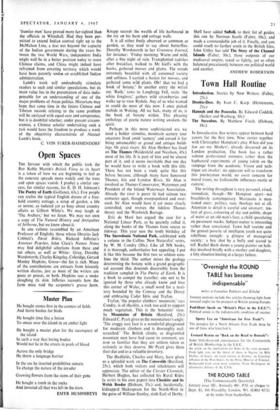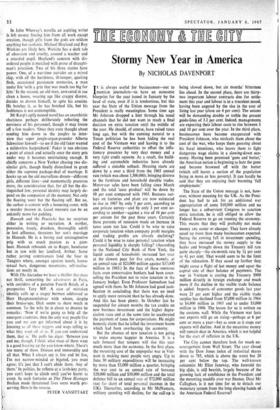Town Hall Routine
Doobie-Doo. By Ivan C. Karp. (Heinemann, 21s.) Hannah and the Peacocks. By Edward Coddrik. (Secker and Warburg, 30s.) The Succubus. By Matthew Finch. (Dobson, 18s.)
IN Introduction, five writers appear between hard covers for the first time. Nine stories together with Christopher Hampton's play When did you last see my Mother?, already discussed on its London production. The book has a rather solemn professional evenness rather than the haphazard experiments of young talent on the rampage from the academic. Vision and tech- nique are insular: no apparent will to transform this journeyman world, no overt concern for moral issues, no fashionable influences exotic or esoteric.
The writing throughout is very personal, visual, immediate, though—Mr Hampton apart—not breathlessly contemporary. Marijuana is men- tioned once: politics, race, theology not at all. Attention to detail is careful and unsmart: tex- ture of grass, colouring of sky and pebble, shape of water or an old man's face, a child speculating on pavement marks. Subject-matter is interesting rather than sensational. Town hall routine and the genteel poverty of intelligent youth not quite rebellious enough: a glimpse of managerial society : a boy shot by a bully and scared to tell. Rachel Bush shows a young painter on holi- day involved briefly with a mother and daughter, a tiny situation hinting at a larger failure. In John Wheway's novella an aspiring writer is left money freeing him from all work except creation, though gifts from the gods are seldom anything but sardonic. Michael Hoyland and Roy Watkins are likely bets. Watkins has a dark tale of obsession and cruelty, around a teacher and a retarded pupil. Hoyland's concern with dis- ordered people is matched with prose of draught- man's precision. Two of his three stories have power. One, of a war-time outsider on a mined ship, with all the harshness, ill-temper, quaking flesh, occasional passionate memories, a man under fire 'with a grin that was much too big for him.' In the second, an old man, unwanted in too clean a house, wearing age like crappy disease, decides to drown himself, to spite his cousins. He botches it, as he has botched life, but his feebleness is not contemptible..
Mr Karp's aptly named novel has an anarchistic chattiness perhaps deliberately reflecting the nerviness of his personnel, though it may freeze off a few readers. 'Once they even thought about sending him down to the jungles to inter- view that super jungle-organ-pounder Alberto Schweitzer himself—to see if the old faker wanted a mildewless harpsichord.' Faker is too obvious a point of attack and actually once the story gets under way it becomes entertaining enough. It chiefly concerns a New Yorker chasing two dis- similar girls, though finally disinclined to grant either the supreme package-deal of marriage. It hooks up on the old marvellous dream—different girls, different lives—and momentarily promises more, the consideration that, for all but the dis- tinguished few, personal identity may largely de- pend on the companion of the moment. Not only the floating voter but the floating self. But no, the author is content with a bouncing conte, with a murder thrown in. Good measure can be an unkindly name for padding.
Hannah and the Peacocks has no surprises either in writing or narration. A mother, possessive, lonely, drunken, thoroughly adrift in lost affluence, threatens her son's marriage to Hannah. He is a boring and unimaginative prig with as much passion as a gum- boot. Hannah rebounds on to Roger, handsome but in tow with her landlord, Arthur. Some rather jarring contrivances land the four in Tangiers where, amongst opulent hotels, homo- sexual bars, dangerous mountains, self-realisa- tions set neatly in.
With The Succubus we have a thriller that does not thrill, concerning the adventures in Paris, with outriders of a putative Fourth Reich, of a prospective Tory MP. A case of mistaken identity calls up a stagey barman addressed as Herr Hauptsturmfuhrer with whom, despite their bruise-ups, Dick seems to share much in common. To the wife he is about to deceive he remarks : 'Now if we're going to help all the emergent countries, then the only way people like you and me can get informed about it is by listening to all these niggers and wogs telling us what they want oft of us. If you can understand them, that is.' He puffs his cigar. 'Between you and me, though, I think what most of them want is a good booting up the you-know-where. There's too many of them. Disease and immorality and all that. What I always say is live and let live, I'm not narrow-minded or bigoted, you must agree; it's just that 'I can't abide them. Any of them.' In politics, he reflects at a latch-key party, you can't hope to climb until you've learnt to creep. In such fantasies as The Three Hostages Buchan made threatened lives seem worth pre- serving. Here is the reverse.
PETER VANSITTART































 Previous page
Previous page